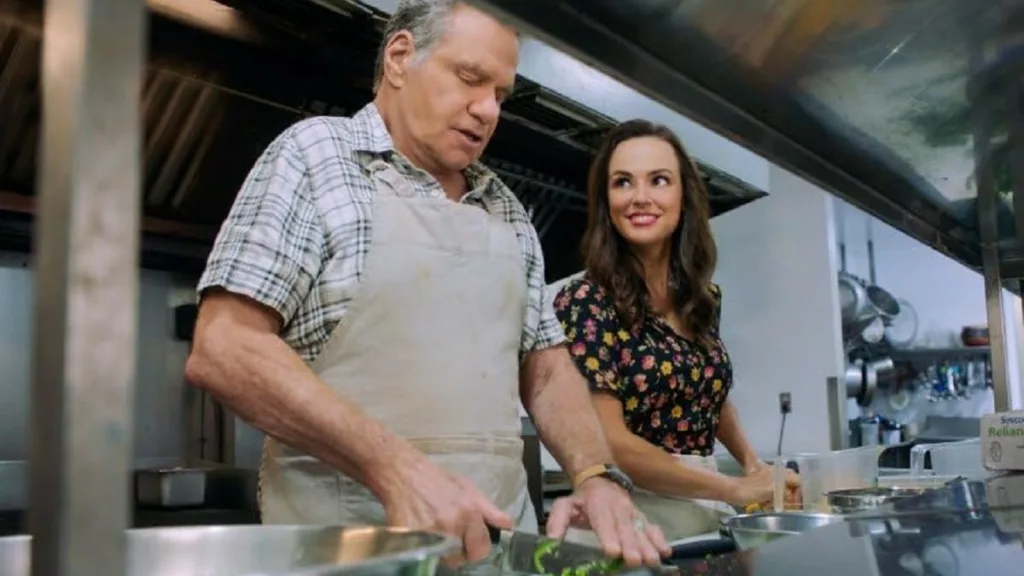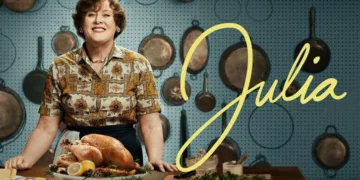A Taste of Love brings a familiar recipe to the table: big city gal rediscovers herself in her sleepy hometown, with a dash of romance and family drama for extra flavor. Chef Taylor Green stars as a disillusioned cooking show host who returns home to figure out her next career move. But she soon gets wrapped up in saving her family’s struggling restaurant from being sold, reconnecting with her first love Jacob who now runs a local farm, and entering a heated cooking competition against smug rival Linda.
As you can guess, self-discovery and passion are the main ingredients here. Between cooking montages, county fairs, and road trips to Latin restaurants, Taylor reconnects with her love of food while helping her parents rediscover their joy of cooking. Lighthearted and comforting as chicken soup, it delivers exactly what you’d expect from a Hallmark rom-com, without much risk-taking or surprise. The ingredients may be familiar, but the cast’s charm and chemistry bake up an enjoyable dish for fans of the genre.
So if you’re craving a sweet story as comforting as your favorite home-cooked meal, A Taste of Love should satisfy that craving. Just don’t expect your taste buds to be dazzled. This meal may fill you up, but it likely won’t linger long in your memory.
Digging Into the Comfort Food Characters
At the heart of A Taste of Love is Taylor’s journey back home to reconnect with her roots. We see her struggle with imposter syndrome as the host of a basic cooking show that doesn’t align with her fine dining dreams. Returning home forces Taylor to confront unresolved feelings about leaving her sleepy hometown behind.
These emotional arcs are softened by the quirky character roster that surrounds Taylor. Her parents Glenn and Patty exude parental warmth, despite their worries over saving the family restaurant. Youthful crush Jacob adds a romantic friction, his boyish farming passion contrasting Taylor’s big city sensibilities. Themes of home and comfort food would not feel as cozy without these characters offering Taylor support, wisdom, and second chances.
Even resident mean girl Linda serves her purpose, representing the ruthless big city that Taylor is unsure she wants to return to. Linda’s smug taunts dare Taylor to re-enter the annual cooking contest, catalyzing the film’s central conflict.
By surrounding Taylor with empathy and encouragement, the script smartly gives her room to grow without having to subvert her core goodness. The characters essentially bake a nurturing environment for self-realization to unfold. We relish Taylor’s small victories, like reconnecting with Jacob over bringing fresh produce into her cooking, because everyone feels invested in her success.
Much like the dishes the film lovingly highlights, A Taste of Love understands the communal nature of comfort food. This isn’t just Taylor’s journey of self-discovery – it is a celebration of the people and places that shape us. The story nourishes our own longing to return home and to the communities that accept us as we are.
Finding Meaning in Food and Home
Like any good comfort meal, A Taste of Love delivers familiar themes of home, family, and following your creative passions. Taylor’s journey subjects her core values to scrutiny, ultimately reaffirming that fame and fortune mean little without connection.
Food serves as the natural metaphor guiding Taylor’s growth. Through cooking we express love, summon nostalgia, and bridge divides. Taylor loses her way creatively when making food becomes a transactional act at her TV gig. Returning home to cook amongst loved ones reawakens her talent. She remembers that food at its best fosters community.
Likewise, Taylor realizes chasing acclaim cannot replace what her hometown gave her – space to develop on her own terms. By movie’s end, staying true to herself means more than accepting a primetime TV deal.
Taylor’s passion is reignited when food and relationships intersect. Reconnecting with Jacob at his lively farmer’s market and seeing ingredients in a new light sparks inspiration. Collaborating with her parents to save their family restaurant through an inherited love of cooking nurtures Taylor’s soul.
The story’s central question – should Taylor take a lucrative TV promotion that betrays her values or stay true to herself – sets up a false binary. The ending suggests she can find professional purpose and remain connected to community. She learns that home isn’t a physical place; it is the people who love you unconditionally.
A Taste of Love concludes that while passion risks growing stale, giving back to one’s roots can perpetually renew the creative spirit. Like the meals Taylor prepares, there is an artistry in cultivating simplicity.
Keeping It Simple on the Screen
As comfort food cinema, A Taste of Love doesn’t aim to dazzle technically. Its modest production design captures the quaintness of Taylor’s sunny Florida hometown without showiness. Audience familiarity is prioritized over stunning visuals.
The camerawork stays focused on the characters, with minimal style flourishes. Gentle push-ins underscore emotional moments, as when Taylor first re-enters her family’s restaurant. Lighting often feels more functional than artistic, conveying time of day rather than symbolic undercurrents.
Editing follows suit, moving the story along without repetitions or excess flair. Establishing shots of locale transitions keep pacing clip-clop steady. There is little crosscutting between scenes or characters for thematic juxtaposition.
What technical choices the film does make serve to reinforce its thematic core. Close-ups of ingredients and stove sizzles trigger ASMR-esque reactions, placing us alongside Taylor re-falling in love with cooking. The soundtrack’s acoustic ballads echo the story’s gentleness.
While more cinematic daring may have benefitted the film, its modest craft decisions ultimately let the comforts of story take center stage. The camera gets out of the way to spotlight sentimentality. Any additional aesthetic complexity may distract from the straightforward themes.
So while far from technically astonishing, A Taste of Love executes its vision without distraction. Much like Taylor rediscovering passion in simplicity, the film finds power in embracing familiarity – both culinary and cinematic.
Cast Brings the Comfort and Warmth
While A Taste of Love breaks little new ground overall, its cast elevates the comforting familiarity. Leads Erin Cahill and Jesse Kove anchor the film with bubbly charm and easy chemistry. Supporting turns add dashes of wisdom and humor.
As Taylor Green, Cahill blends optimism with emotional transparency. We believe her internal struggles to reconcile ambition with community ties. Jesse Kove counters with salt-of-the-earth appeal as Jacob, grounding Cahill’s big city mannerisms in relatability. Together they make an easy to root for on-screen pair.
Veteran baddie Martin Kove also impresses against type as Taylor’s dad. His warmth provides a worthy source for Taylor’s inherited passions. Even smug rival restaurateur Linda gets humanized through Ashley Dulaney’s performance, less villain than simply oblivious.
What sells the experience most is the chemistry cementing these relationships. Cahill and Kove’s characters share history together we can feel. Taylor’s joy cooking with her parents radiates off-screen closeness. Most interactions carry the shorthand of friends despite years apart, underscoring the story’s themes of unconditional love.
While the comfortable script deserves credit, it is the cast that makes this film feel like a slice of home. Their interplay sweeps us into familiar rhythms where self-acceptance and support are foregone conclusions. A Taste of Love delivers an unsurprising but sweet-natured comfort food experience thanks to these talents. Sometimes the simplest ingredients still make for a satisfying meal.
Breezy Pacing Complements Lighthearted Tone
From start to finish, A Taste of Love commits to an upbeat and gentle pacing that complements its feel-good themes. The tempo largely wafts along like a light summer breeze, matching the movie’s coastal Florida setting.
After brief glimpses into Taylor’s cooking show gig stress, the story really kicks in once she returns home. There’s a lilting, unhurried quality to Taylor reconnecting with family and Jacob, strolling beaches and farmer’s markets. Montages of county fair hijinks and kitchen prep sessions breeze by, peppered with comic beats.
The closest we get to true conflict comes from Linda’s casual antagonism. But rather than upend the mood, Linda’s smugness adds buoyant upticks akin to the competitive zing of a game show. There is never a sense Taylor won’t overcome obstacles through resilience and community support.
While easygoing to a fault for some viewers, those craving an uplift will appreciate the consistent optimism. Lingering shots of tasty food and pretty locales supplement the cheeriness. The only tonal downshifts come from necessary moments of emotional vulnerability, ultimately making Taylor’s growth feel more earned.
Baked into the foundations, the film’s breezy tempo mirrors the comforts Taylor finds by not running from who she is. Low dramatic stakes let charm and earnestness shine instead. A Taste of Love keeps conflict mild so relationships can satisfy our craving for positivity.
Satisfying Food for the Soul
At the end of the day, A Taste of Love delivers exactly what its packaging suggests: a warm, gentle-spirited tale as cozy and familiar as chicken soup. Fans of undemanding Hallmark fare should leave satisfied. Yet more discerning palates may desire a bit more flavor.
The cast shines brightest here, elevating the thin story with earnest charm. Leads Erin Cahill and Jesse Kove make for an engaging on-screen pair, matching bubbly energy with down-home appeal. Supporting turns provide enjoyable texture, especially Martin Kove’s change-of-pace paternal wisdom. Their collective chemistry fosters the welcoming spirit of home.
While comfort is this meal’s main menu item, the story ingredients offer too little nutritional value on their own merits. The plot beats, themes of home and family, even Taylor’s self-realization arc all feel pre-cooked to the point of cliché. An over-reliance on food as metaphor also limits the depth of storytelling.
Yet maybe comfort is the point. Viewers seeking cinematic innovation won’t find much novelty here. The goal seems geared more towards stoking nostalgia and good vibes. In that sense, while far from groundbreaking art, A Taste of Love achieves its aims.
Sometimes what you crave is a tried-and-true favorite guaranteed to satisfy if not surprise. For those times when only a cozy Hallmark rom-com will do, this film should whet that appetite just fine. Just maybe chase it with something more daring to cleanse the palate afterwards.
The Review
A Taste of Love
A Taste of Love offers comfort food cinema that delivers exactly as expected - familiar ingredients that satisfy without dazzling, held together by the charm of a talented cast. It doesn't take risks, but makes following your bliss seem as breezy as a sunset beach stroll. For fans of gentle Hallmark fare, it should perfectly hit the sweet spot.
PROS
- Strong lead and supporting performances with likable chemistry
- Feel-good themes about family, home, and following your passions
- Lighthearted tone and brisk pacing complement the story
- Beautiful coastal setting and scenery
- Delivers exactly what Hallmark fans expect
CONS
- Formulaic plot with predictable story beats
- Underdeveloped characters and relationships
- Over-reliance on food as a metaphor limits depth
- Lacks narrative ambition or cinematic innovation
- Won't appeal to those seeking more originality




























